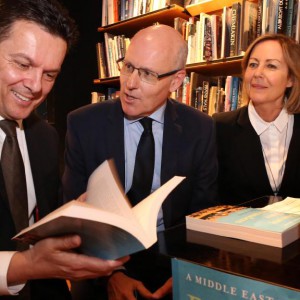Objectivity doesn’t come easy when reporting on Israel

Leading international journalists have talked about the extraordinary pressures they face when reporting from Israel.
The former New York Times bureau chief in Jerusalem Jodi Rudoren has admitted to “defensive writing” after several “Twitter campaigns” against her.
Rudoren says this was “to protect myself and keep me focused on the essence of what I’m trying to do instead of these distractions but you could totally get out of hand with this”. She says there is not a healthy debate in the US about Israel because of the power of pro-Israel lobby group AIPAC.
The interviews are contained in Balcony Over Jerusalem, in which journalists tell how they come under attack from pro-Israel groups if they report what they see in Israel and the West Bank.
Reuters has a special rule book on what wording must be used while German’s largest newspaper group, owned by Axel Springer, makes journalists sign that they agree to “support the vital rights of the people of Israel”.
As The Australian’s Middle East correspondent for six years, I also encountered repeated pressure from the privately funded, Melbourne-based lobby group the Australia/Israel and Jewish Affairs Council. After one attack, the then editor of The Australian, Clive Mathieson, wrote to the head of AIJAC, Colin Rubenstein, to say that repeated attacks on AIJAC’s website for one story — for something the story did not say — “border on the malicious”.
The book also reveals what occurred three weeks after Foreign Minister Julie Bishop said East Jerusalem was not “occupied”. “Occupied East Jerusalem” is accepted under international law and Israel’s Supreme Court stated in 2004 that Israel holds the West Bank in “belligerent occupation”.
But SBS issued new guidelines that went even further than what the far-right in Israel demands: they pressure journalists to describe the Palestinian Territories as “disputed” rather than “occupied”. “We should avoid describing settlements as on Palestinian land or on disputed land, or occupied territories,” SBS told staff on June 19, 2014.
Former editor-in-chief of The Australian Chris Mitchell says he refused to take calls from Rubenstein — who he described as a “bully” — after Rubenstein called one of Mitchell’s reporters, Elisabeth Wynhausen, “a self-loathing Jew”.
Rubenstein has confirmed that he did complain about Wynhausen but cannot recall calling her a self-loathing Jew.
The New York Times’ Rudoren says that because the occupation of the Palestinians has gone on for so long — 50 years — it has started to look “a lot like apartheid”.
While Rudoren was talking about the situation for Palestinians in the West Bank, she also addressed the plight of Palestinians in Israel — the so-called Arab Israelis.
She says: “I actually think the issue of apartheid is more relevant to how Arab Israelis are treated within the framework of the country (Israel).”
Veteran New York Times journalist Clyde Haberman — himself Jewish, like Rudoren — said every NYT Jerusalem correspondent has been subjected to “non-stop assault” and therefore few want the posting.
“We’ve had decades of correspondents that, no matter how talented they are or how many Pulitzer Prizes they have to their name, always end up being accused of being either anti-Semites or self-hating Jews; at some point, this seeps into the DNA of the newspaper. This is what you can expect if you go there — to have your integrity hurled back in your face every single day,” Haberman says.
In the book, leading Israeli journalist Akiva Eldar has a blunt message for AIJAC. “I’m willing to be on (the) record and tell the AIJAC people and the Australian government that they are playing with my future, that they don’t give a shit about my children, it’s about their arses,” Eldar says.
“Australia should understand that in the US, Israel is a domestic political issue. Australia has to look at its relationship with Israel independently, because the US is not innocently looking at it.
“I tell my Australian friends and family that you live in Australia and even if you tell your government not to interfere, to take a step back and say nothing, this plays into the hands of the Likud (the political party of Prime Minister Benjamin Netanyahu), because this is exactly what Netanyahu wants you to do.
“He wants business as usual. There is a clear distinction between supporting Israel and supporting the Israeli government and Israeli policy.
“If Australia voted in favour of a Palestinian state along 1967 lines, it would be very difficult for the Israeli government to smear them and say they are anti-Semites, because you have a very clean record.”
John Lyons is The Australian’s Associate Editor (Digital Content) and the author of Balcony Over Jerusalem